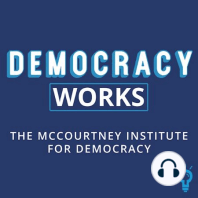32 min listen
Using the tools of democracy to address economic inequality
FromDemocracy Works
ratings:
Length:
36 minutes
Released:
Jan 28, 2019
Format:
Podcast episode
Description
Democracy and inequality have been at odds for as long as democracy as has existed. As the gap between rich and poor widens, so too does trust in political institutions and faith in democracy itself.Chris Witko, associate director of Penn State’s School of Public Policy and author of The New Economic Populism: How States Respond to Economic Inequality, argues that states can step in to address economic inequality while the federal government is embattled in political polarization.Witko argues that democracy and capitalism will never fully be reconciled, but lessening economic inequality will go a long way toward strengthening democracy.Additional InformationThe New Economic Populism: How States Respond to Economic InequalityThe Conversation: States are on the front lines of fighting inequalityPenn State School of Public PolicyDiscussion/Reflection QuestionsWhat is the relationship between democracy and economic inequality?Whose responsibility is it to address inequality?What policies should be taken in order to reduce inequality?Do you think that individual states are doing enough to reduce inequality?Do you think that multiple states adopting politics like minimum wage increases will spur federal action?Interview Highlights[6:02] Why are income inequality and democracy closely linked?We are going to have some inequality in a capitalist system, but when we are in a democratic capitalist system that assumes some level of equality, there is a concern when you have extreme levels of extreme inequality.[6:53] Talking about problems of Democracy in United States, do you agree with the statement that we can’t start to fix what is wrong with democracy until we address the issue of inequality?Yes. When you see the extremes of wealth and inequality, you see that wealthy people can use their money for politics, so that generates an unequal political influence.[7:50] Whose job to fix the problem of inequality?In the United States we tend to think that the public is not concerned about inequality and that’s relatively true in comparison with Europe, but according to survey data, the public is really concerned about inequality and they want the government to do something to fix it.[10:15] If public opinion really does supports action on inequality, why isn’t it moving forward?The polarization is preventing anything getting done, and when you have big interests and the wealthy has gib influence in politics, that makes it really hard to get any chance of getting any egalitarian policy in Washington DC.[13:09] How can we use the tools of democracy to fight inequality?We do have in the states that we don’t have in Washington DC is direct democracy, in which desires from majority are expressed, but sometimes terrible policies can restrict rights from minorities.[14:30] If a state want to take action either in minimum wage or thru the earning income tax, it is a tipping point to take action at the federal level?Yes. We have seen it in the past. A lot os states has a higher income wage than the federal minimum wage an at this point it is natural that there’s not an opposition at the federal level because a lot of businesses are already adjusted to that level of income wage.[15:17] What is the Earned Income tax Credit? How that it be a solution for that states that are looking to solve inequalities?It’s a tax credit that comes back to workers who don’t earn a lot of money so you can actually end up getting cash back from the government when you file your tax return. That’s something that started at the federal level and then has proliferated down to the states and now the states are doing more to expand their earned income tax credits. It’s another policy tool that you can use in a more conservative area where maybe you don’t want to increase taxes on the wealthy, but you want to bring up the incomes of lower income workers.[16:49] Can you talk about how populism fits into this inequality conversation?The public is concerned about inequality and a
Released:
Jan 28, 2019
Format:
Podcast episode
Titles in the series (100)
It’s good to be counted: The next census is just around the corner 2020, and the U.S. Census Bureau is already hard at work on preparing to count the more than 325 million people in the United States. The census is one of the few democratic norms that’s required by the Constitution, and the data collected has wide-ranging uses. The … Continue reading It’s good to be counted → by Democracy Works
